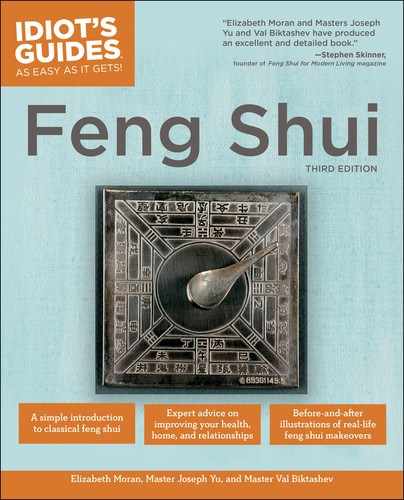Appendix B
Common Questions and Practical Answers
Q: What exactly is feng shui?
A: Feng shui is the art and science of determining how the environment and your home affect you over periods of time. Feng shui can predict, prevent, and encourage events with great accuracy.
Q: Are there certain telltale factors that distinguish a classical-trained practitioner from one who uses modern techniques based on superstition and myth?
A: Yes. Simply, ask questions! First ask what kind of feng shui he or she practices. The answer should be classical or traditional feng shui. If the answer is Bagua School or Compass School, this could mean the consultant practices faux feng shui, in which a home is divided into sections of wealth, health, family, career, and so on. This method is too simplistic. Please see Chapter 1 for a review of authentic and faux schools of feng shui.
Q: I heard feng shui is a Daoist art. Is this true?
A: No. The philosophy of Daoism and the science of feng shui developed at the same time and share common roots. Although feng shui’s origins are lost in history, the tradition actually predates Daoism, Buddhism, and Confucianism by several thousand years. As early as 6000 B.C.E., some sort of astronomical/astrological system was used to determine auspicious grave and dwelling sites.
Q: Do you need a compass to practice feng shui?
A: Yes. Just as a hair stylist needs a pair of scissors and a doctor needs a stethoscope, a feng shui practitioner needs a compass, but it doesn’t have to be a Chinese luopan. A Western-style compass featuring two-degree gradations is sufficient. Without a compass, it’s impossible to determine your home’s trigram. Guesswork just won’t do. Obtaining an accurate reading is the first step toward ensuring an accurate analysis. An incorrect assumption may cause harm to you and your family. For example, you wouldn’t want your hair stylist to assume he or she has selected “Bombshell Blond”—your hair color. You would expect him or her to be certain. Furthermore, you would expect the stylist to have read and know the hair-coloring procedure thoroughly. Otherwise, your hair might fall out!
Q: Can feng shui really bring me health, wealth, and happiness?
A: Feng shui can only increase the probability of these things happening. For example, a Flying Star reading may indicate good fortune, but it’s up to you to make it happen. Feng shui can create only an urge, increasing your motivation and likelihood of success. Feng shui is not a cure-all solution.
Q: Can you flush your wealth away if a toilet lid is left open?
A: Only if you empty your wallet into the bowl!
Q: Where’s the best place to hang a mirror?
A: Historically, the use of mirrors to remedy qi has never been part of feng shui’s tradition. The concept of mirrors as magical power devices that can stimulate, ward off, or absorb qi is a recent invention dating to the 1980s. This misconception is an excellent example of playing “telephone”—the childhood game in which one kid whispers a sentence in the next kid’s ear. At the end of the line, the sentence bears no resemblance to the original.
In ancient China, mirrors were made of bronze, polished on one side, with various cosmological designs on the other. These mirrors were similar to the precursor of the luopan compass, an ancient divination tool called the shipan, which was thought to reflect, or mirror, the perfect world before the demon Gong Gong battled Zhu Rong for the Empire. During the fight, the northwest mountain (one of eight separating heaven from earth) collapsed, causing the northwest to tilt upward, and the southeast to tilt downward. As a model of the perfect world, the ancient cosmographs and bronze mirrors were thought to have magic power. Somehow, they have been mistakenly incorporated into feng shui.
Q: There are so many books and classes on feng shui. How do I know who’s right?
A: It’s up to you to search for the truth. Unfortunately, the ancient Chinese tradition of feng shui has been watered down and misrepresented. In large part, this is due to people not doing their homework. Our advice is to go directly to source material. Thumb through Joseph Needham’s seven-volume work, Science and Civilisation in China. Check out scholarly material at the library or on the Internet. You do the homework. You decide fact from falsehood. Please see Appendix C for a credible list of reading material and websites about classical feng shui.
Q: When determining the construction year of a dwelling, how do you treat additions to a house?
A: The only reliable source is from Qing dynasty (1644–1911) feng shui master, Shen Zhu Reng’s book, Shen’s Time and Space School (Shen Shi Xuan Kong Xue). He says if the new and old parts are connected so that the qi can flow freely, and the main entrance is in the new part, then the whole house is considered new. Therefore, use the construction date affiliated with the addition. On the other hand, if the main entrance is in the old part of the house, then the whole house is considered old. In this case, use the original construction date of the house. If there is a door in the new addition, but the old entrance is retained and both doors are used, then the old part is old, and the new part is new. Two Flying Star charts must be drawn.
Q: When determining the construction year of a dwelling, how do you treat a house whose roof was completely changed?
A: This is controversial. If the roof is removed and the inside of the dwelling is exposed for at least one month, the house is considered new.
